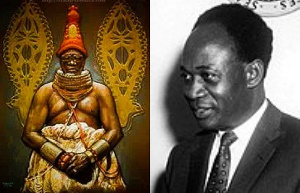Historian and lawyer, Anokye Frimpong, has shared the story of the great grandfather of Ghana’s first President, Dr Kwame Nkrumah, Kaku Aka I, who refused the rule of the British way before Nkrumah was born..
Speaking in an interview on Max TV, shared on Facebook on September 7, 2023, Historian Anokye Frimpong said that Nkrumah’s great grandfather was the only chief who refused to sign a bond during his era to be ruled by the rules of the British colonial masters.
“The British were forcing all the chiefs to sign a bond… if you didn’t sign and you died and people were being killed in your area, the British had no power to come there and stop the fighting. They (the British) also had no power to stop the slave trade or pioneering in the areas whose chiefs had not signed the bond.
“There was this chief in Nzema called Kaku Aka, who was given the bond to sign. After the bond was read to him, he said his understanding of the bond was that even though the land belonged to his people, they would be ruled by the laws of the British which means that they would be selling their freedom to whites. So, he would never sign the bond,” he is in Twi.
He added that Kaku Aka the I told the remaining chiefs who had signed the bond that they were foolish because they had sold their freedom to the whites.
Lawyer Anokye said that the statement of the chief infuriated the British which led to them waging a war on him, which they won.
He added that after the Nzemas were defeated, Kaku Aka was arrested and shipped to Cape Coast, where he was to be imprisoned and trialed.
“During the trial, he was asked whether he was guilty or not guilty and the chief told them that “he was never told by his ancestor that ‘a sovereign chief could be trialed by the court of another power and that what he knows is that every country has its own laws and the leader of one country cannot be arrested and trialed by a court of a different country; so he had nothing to say and they can kill him if they want’,” he said.
The historian added Kaku Aka was initially sentenced to death for his defiance, but his sentence was later reduced to solitary confinement, and he died after six years in prison.
“After he died, the white people said he was a great man; so he was buried at the Cape Coast Castle… because he defended his conscience,” he said.
Watch the interview below:
 Home Of Ghana News Ghana News, Entertainment And More
Home Of Ghana News Ghana News, Entertainment And More





